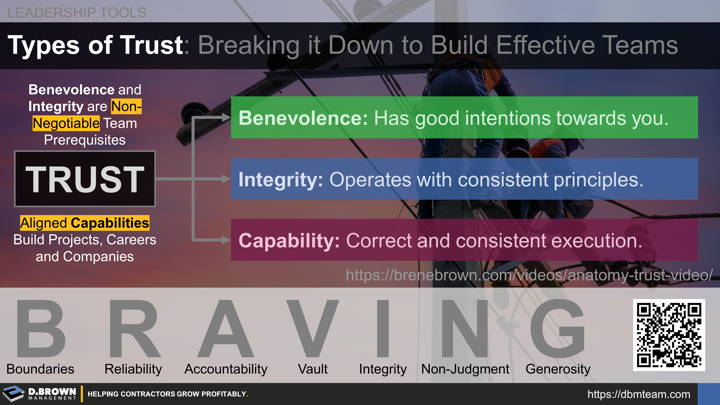Teams, projects, and contractors are held together by trust. The word "trust" is used a lot, yet for all its importance, trust is one of the most misunderstood words out there. Knowing the components of trust will allow you to build trust and troubleshoot breaches of trust quickly.
Let's start with the three major categories of trust. Think about these in terms of whether you are trying to build trust with others, give specific feedback to someone about the boundaries of your trust with them, or troubleshoot breakdowns of trust on your team.
- Benevolence: Does this person have good intentions toward you? What's in their heart? Too often, we tend to frame mistakes or capability gaps as bad intentions. What would it look like if the assumption was that people were always doing the best they can?
- Integrity: Does this person consistently act according to a set of guiding principles that include values, code-of-conduct, and non-negotiable boundaries? You are looking for consistency in how people act: the "why" behind their actions. You are looking for alignment between their guiding principles and yours. Don't assume actions that look to be inconsistent or in conflict with your own principles actually are. Ask good questions to understand how the other person arrived at their answers. Expose your thought process clearly as you convey your intent to your team. Take the time to write your values and principles to be used as discussion points to help align teams.
- Capability: Does this person have the skills, tools, experiences, relationships, etc. for you to trust that they will get something done? Have they demonstrated consistency in execution to the people that need to trust them in this situation? This is an important boundary: the extremely loyal operator you "trust" to open up more trench than anyone else on the crew is not the same as the foreman you "trust" to always bring the job in on time and under budget. When talking through trust in capabilities, it is important to be clear about the expected outcomes and to be clear why you don't fully trust this person to achieve those outcomes. We need to be careful not to assume a capability gap when it might be a problem of the individual being at their max capacity or a lack of understanding the objective. Again, good questions and a brief back certification process can help diagnose. Also remember that with practice, capabilities can be built over time.
Benevolence and Integrity are non-negotiable team prerequisites.
Aligned capabilities builds projects, careers, and companies.
Dr. Brené Brown does a great job of breaking down trust into individual components using the acronym BRAVING that can be a helpful tool for communicating and troubleshooting.
Anatomy of Trust video
- Boundaries: Trust sits on a foundation of clear boundaries. What boundaries can you set and communicate clearly that would improve your trust in others? Their trust in you?
- Reliability: Trust is built through consistent actions over time. Trust is about predictability and has a lot to do with the small daily details. Trust is a one-to-one relationship. You may have built trust with 10 people through consistent reliable execution, but when you move to a new team you need to start the process all over. Get good at it. Details matter. As a leader, get good at creating opportunities for people to demonstrate reliability.
- Accountability: If you breach trust in any way as perceived by the other person, you quickly take responsibility, apologize, and make amends. Again, asking good questions is one of the best ways to understand fully how trust was breached. If you are the one providing the feedback about how someone else breached your trust, then you owe it to them to communicate specifically what the breach was. Generalities can't be fixed.
- Vault: Never breach confidence in any way, large or small, unless it is a life safety issue. Treat all one-on-one conversations as confidential. Get permission from the other person to share information if needed. People who gossip are often talked to and never trusted.
- Integrity: Truly living by a set of principles, especially when they are difficult.
- Non-Judgment: Being able to ask for help and receive it without any judgment. Never trust anyone that doesn't ask for help. Build trust in others by truly asking for their help.
- Generosity: Assuming the best intentions about someone - assuming benevolence. Dr. Brené Brown describes her husband's approach and how it helps him be better.
Remember:
- "Operations occur at the speed of trust." - Retired General Jim Mattis
- All deals require a moment of trust and "Time wounds all deals, sometimes even fatally." - Stephen A. Schwarzman
- One of the most hurtful things you can do is say or imply that you don't trust someone, which is why it is critically important to be specific when communicating about trust.
- Until you have the trust of your leader and your team, you will be completely ineffective no matter your intentions or talents.
- Trust is built with consistent small actions every day over time.
Further Reading:

